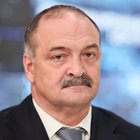Meeting with Head of Daghestan Sergei Melikov
Vladimir Putin held a working meeting with Head of the Republic of Daghestan Sergei Melikov at the Kremlin.
Sergei Melikov reported that, according to data covering the 11 months of 2024, the republic’s manufacturing sector grew by more than 6.5 percent, and agriculture grew by over seven percent. Average wages across the economy increased by 15 percent. The volume of investment rose by nearly 16 percent over nine months compared to the same period in 2023. The economic growth index stands at over 100 percent. In 2024, the budget was executed at 97.6 percent, putting Daghestan in the 14th place among the constituent entities of the Russian Federation. The investment programme results are strong as well, with 222 new sites commissioned during that period, the bulk of which are social facilities, primarily education institutions.
According to the head of the republic, six projects under the socioeconomic development programme for the North Caucasus Federal District, ranging from the construction of industrial enterprises to the development of the agro-industrial complex, are being implemented. Over the past two years, around 3,000 new jobs have been created. He noted particularly the enterprise Polosa, which planted a hazelnut orchard of nearly 2,500 hectares last year making it the country’s largest hazelnut orchard.
In 2024, with over 300,000 tonnes of grapes harvested, the republic achieved the grape harvest comparable to that of the Soviet era. Three-quarters of the grape harvest are processed in the republic into brandy, wine, and other products, and around 20 percent are shipped to other regions. In terms of vineyard area, Daghestan is second only to the Krasnodar Territory.
Other types of agriculture are making strides as well. Certain successes have been achieved in rice farming, vegetable cultivation, and the production of meat and wool. In recent years, the lack of storage facilities for finished goods has been a traditional issue for Daghestan, so efforts are being made to expand the fruit and vegetable storage capacity. In 2022, 5,000 tonnes were stored. This figure is planned to reach 25,000 tonnes in 2024–2025 and up to 50,000 tonnes by 2030.
Sergei Melikov also underscored achievements in the industrial sector. Over the past four years, nine modern, diversified industrial facilities have been launched. He particularly highlighted two of these. One is the Caspian Glass plant, which manufactures spherical components for fibreglass production. Last year, an agreement was signed to establish a joint venture with entrepreneurs from Uzbekistan, who have expressed strong interest in collaborative endeavours. This year has seen the opening of the Exonor polymer pipe plant, which holds significant importance given the rapid development of tourism and construction projects in the republic. Exonor represents an investment exceeding three billion rubles.
The Head of Dagestan further raised the issue of energy generation shortfalls within the republic. The region has pursued renewable energy solutions, with three major projects already underway: in northern, southern, and central Dagestan. Notably, a collaborative project with Rosatom is developing a wind farm with a capacity exceeding 300 megawatts.
Responding to the President’s inquiry regarding tourism growth, Sergei Melikov reported 1.9 million tourists last year, with annual growth rates approaching 15 percent. Under the Five Seas and Lake Baikal programme, plans have been announced to construct 28 hotels, prioritising three- and four-star establishments accessible to ordinary citizens rather than pursuing ultra-modern five-star complexes. Additionally, plans are advancing for a nationwide children’s centre on the Caspian Sea coast.
Discussions also addressed participants in the special military operation, with Dagestan being home to 13 recipients of the Hero of Russia distinction. Sergei Melikov recounted the heroic actions of two such individuals – Magomed Isbakiyev and Zakarya Aliyev. He affirmed that their families, along with those of other servicemen and those who tragically did not return, remain under continuous oversight. The President instructed the republic’s leader to maintain personal engagement with these matters. Sergei Melikov confirmed his direct and ongoing involvement with each family, including a current initiative tailored to Dagestan’s Muslim community. Approximately 5,000 pilgrimage placements have been coordinated with the Muftiate for Hajj journeys, with 2,500 allocated to Dagestan. The majority are reserved for those who have lost relatives or are currently deployed, including families with four or five members on currently the battlefields.
Sergei Melikov elaborated on two additional initiatives: Memory Gardens and Mountain Valour – serving as a counterpart to the nationwide Time of Heroes programme. Furthermore, several projects in the republic are being financed through extra-budgetary sources. These include a rehabilitation centre for severely wounded servicemembers, including those with barotraumas, funded by Dagestani investors. The facility is planned to provide between 200 and 300 beds. A strategic site has been selected adjacent to the military hospital of the Caspian Flotilla under-construction, ensuring a comprehensive rehabilitation support cycle.
The meeting subsequently continued with detailed discussions on outstanding challenges.







